Gator Bowl memories: Jacksonville's bowl game has a rich history entering its 78th year
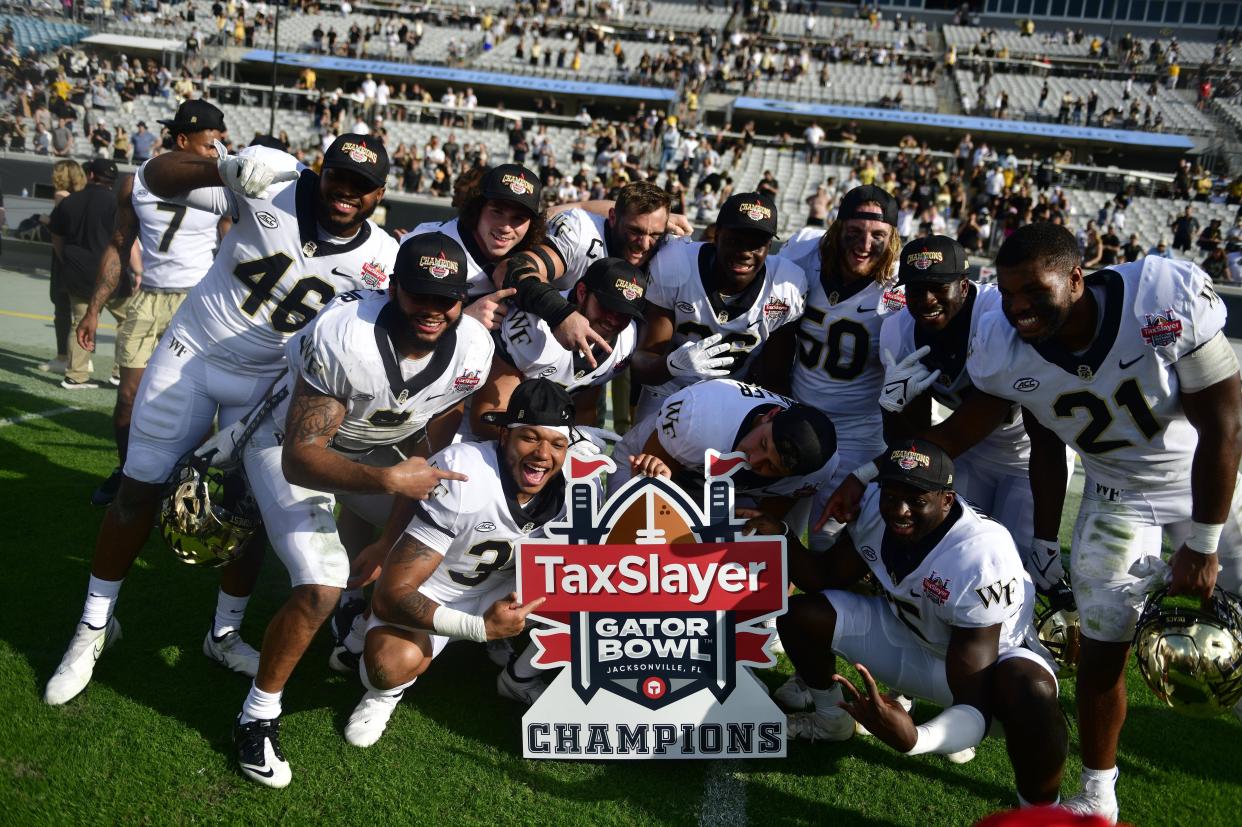
- Oops!Something went wrong.Please try again later.
- Oops!Something went wrong.Please try again later.
- Oops!Something went wrong.Please try again later.
- Oops!Something went wrong.Please try again later.
The TaxSlayer Gator Bowl will be played for the 78th time on Dec. 30 at TIAA Bank Field.
Few bowls have that kind of history. The Gator Bowl is the sixth-oldest college bowl game, following the Rose (started in 1902), the Orange, Sugar and Sun Bowls (all in 1935) and the Cotton Bowl (1937).
More Gator Bowl coverage
New leadership: Nelson Bradshaw named TaxSlayer Gator Bowl volunteer chairman
Gene Frenette: Victor at Gator Bowl as much Jacksonville as it was Wake Forest
Burning desire: Fleming Island native Ryan Smenda's competitive outlook fuels Wake Forest at Gator Bowl
The Gator Bowl was the first to be established post-World War II when a group led by the Downtown Lions Club wanted to put together a postseason game that would bring tourism and national publicity to Jacksonville. The first game was played in 1946, with Wake Forest beating South Carolina 26-14.
That first game held a historical link to the most recent game on Dec. 31, 2021. Wake Forest made its first appearance since that inaugural game, and beat Rutgers 38-10. the Knights were in the game for the first time ever.
Rutgers was the 51st team to play in the Gator Bowl. Nine conferences have sent teams to Jacksonville and there has been coast-to-coast representation: Syracuse and Rutgers are the northernmost teams to have played in the game, while Stanford is the only team from California.
Colleges from 27 states have played in the game, including Wyoming, Colorado, Nebraska, Iowa and Missouri. And their fans have supported them over the years, with a total attendance of more than 4.3 million.
Here's a slice of Gator Bowl history and minutiae from nearly eight decades of Jacksonville's holiday college football tradition:
The stars have come out
Players who have won every major college football individual award have competed in the Gator Bowl, led by Heisman Trophy winners John David Crow (1957), Pat Sullivan (1971), Earl Campbell (1974), George Rogers (1980) and Lamar Jackson (2017).
There have been six winners of the Outland Trophy for the nation's best interior lineman, three Lombardi Award winners for the top lineman, four Maxwell Award winners for the nation's top player, two Davey O'Brien Awards for the best quarterback and two Biletnikoff Awards for the nation's top wide receiver.
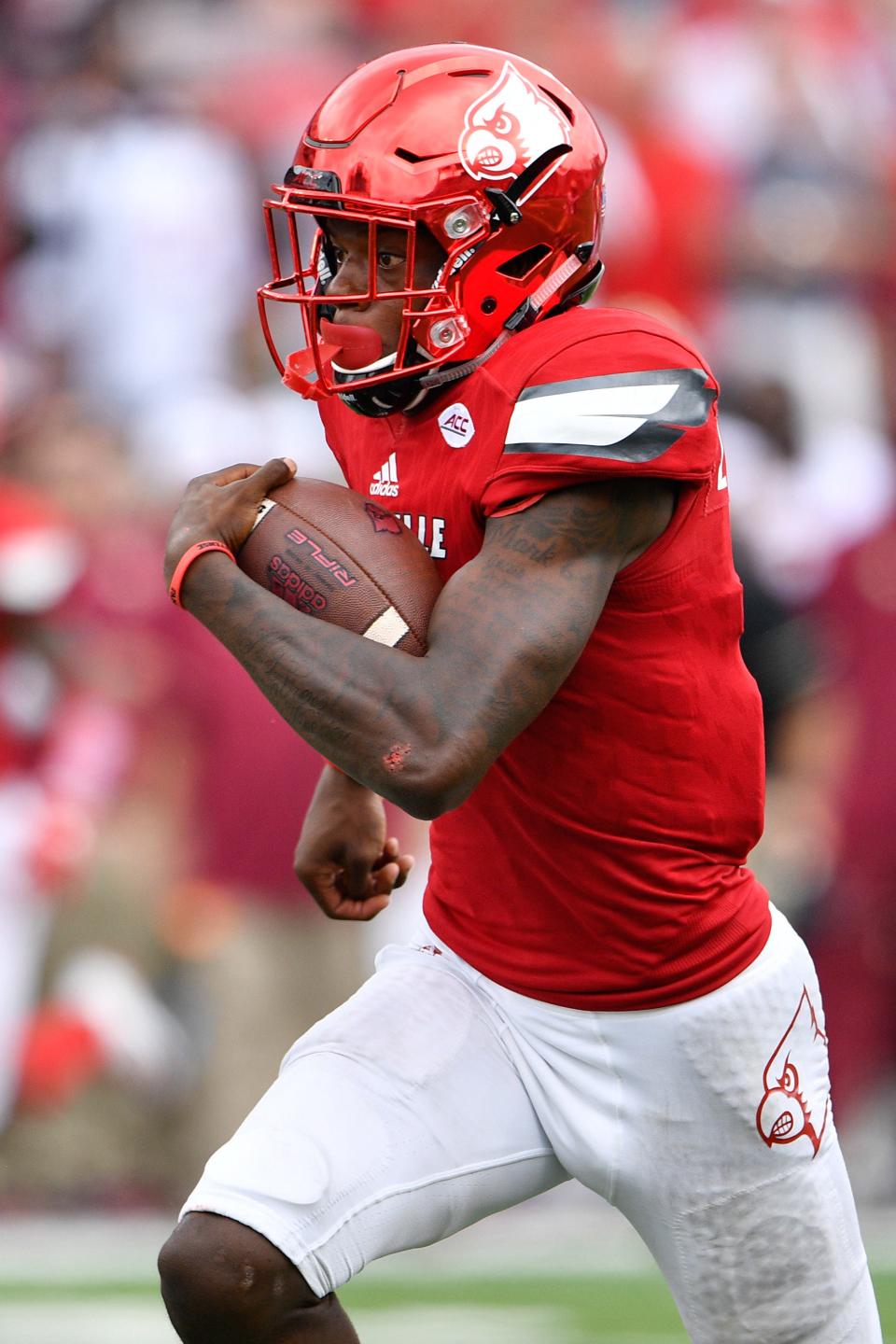
The latter is named for former Florida State wide receiver Fred Biletnikoff, who still holds the Gator Bowl record for the most touchdown receptions in one game with four in 1965.
There have been 172 AP All-Americans. Penn State has produced the most to have played in the Gator Bowl with 15, and Pittsburgh has 13.
Most frequent visitors
The Florida Gators and Clemson Tigers have played in the most Gators Bowls, nine times each. Next is Georgia Tech with eight appearances, followed by Florida State, Tennessee, North Carolina and West Virginia with seven each.
When Texas A&M opted out of the game last year, it enabled the ACC to tie the SEC for the most teams playing in the Gator Bowl with 46 each. Next is the old Big East with 18 and the Big Ten with 17.
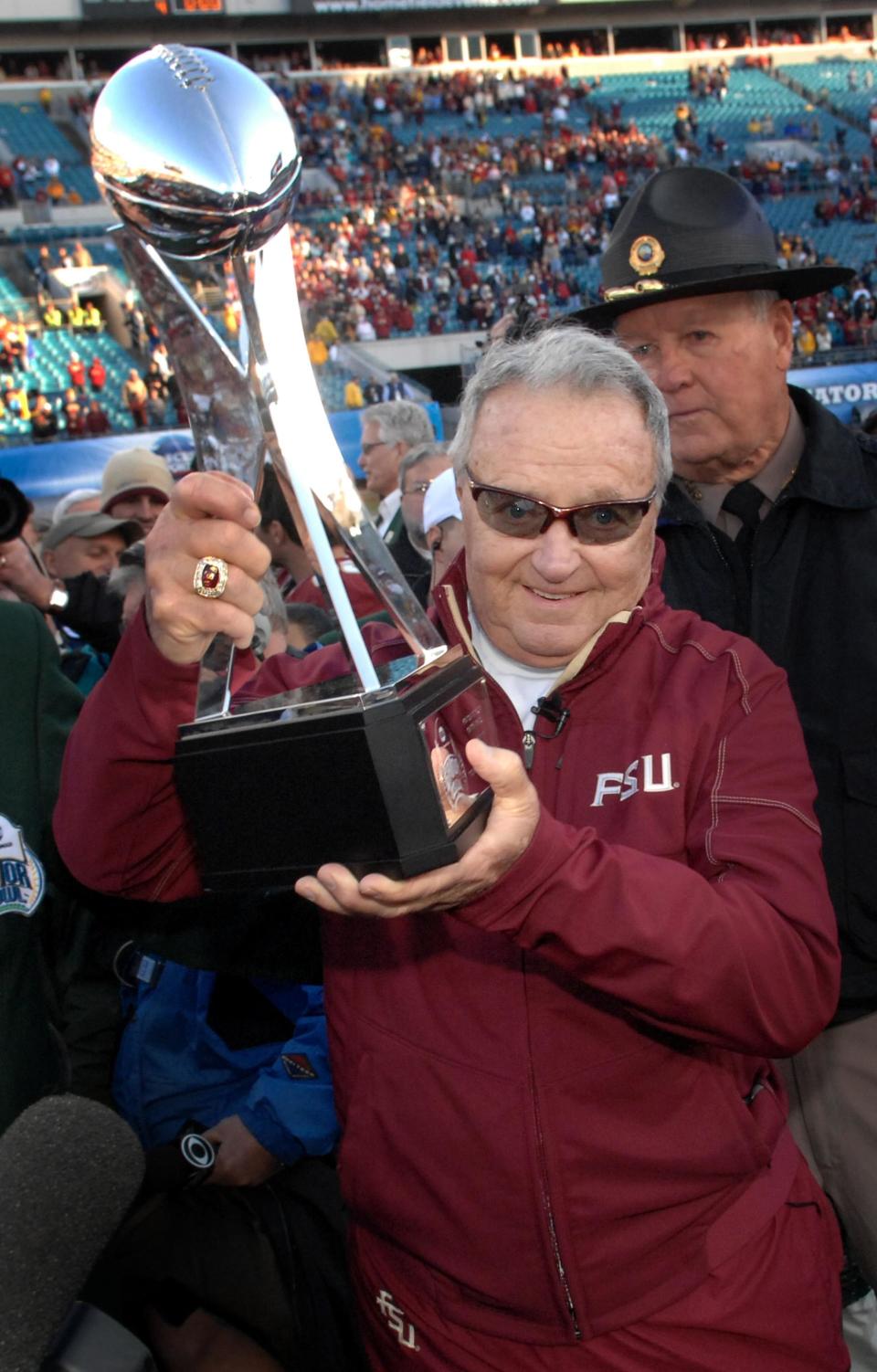
Predictably, the closest teams to the Gator Bowl have usually brought the most fans. The game record is 84,129 for the 2010 game between Florida State and West Virginia, but there was some extra spice that year: it was the final game for legendary Seminoles' coach Bobby Bowden.
Prior to that, the attendance record was Clemson vs. West Virginia in 1988 (82,911).
But based on average attendance per game, Florida State fans can take a bow: Gator Bowls with the Seminoles as one of the teams have averaged 72,171, with five of the seven games attracting 70,000 or more fans.
Taking a bow
When Bowden guided FSU to a 33-21 victory over West Virginia in his final game, it was the third time that a coaching legend made the Gator Bowl his final game.
However, one was not voluntary.
Ohio State's Woody Hayes coached his final game for the Buckeyes in the 1978 game, a 17-15 loss to Clemson. Hayes was fired the next day for punching Clemson linebacker Charlie Baumann after an interception killed Ohio State's final chance.
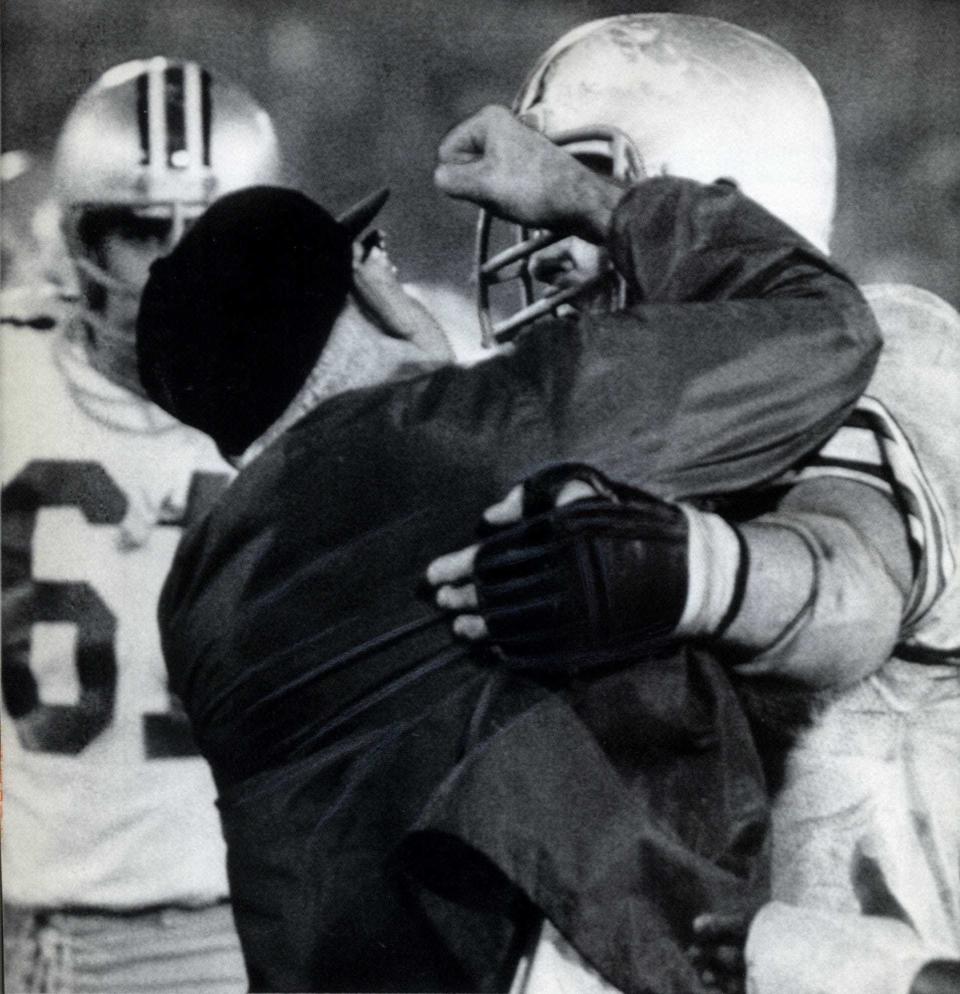
The other notable final game for a coach was in 1989 when Vince Dooley ended his illustrious career with the Georgia Bulldogs with a 34-27 victory over Michigan State.
Dooley also played his final college game in the Gator Bowl. Playing quarterback for Auburn, he gained 56 yards rushing and completed four of eight passes for 49 yards in a 35-13 loss to Texas Tech.
There was a third bit of Dooley history in the Gator Bowl. In 1971 he met his brother Bill, who coached North Carolina, in the "Dooley Bowl." The Bulldogs won 7-3.
All-Stars in the booth
The Gator Bowl is notable for being the first coast-to-coast TV broadcast of a bowl game with the 1954 game between Auburn and Baylor. It has been aired on the three major TV networks (ABC, CBS, NBC), plus ESPN and TBS.
The list of broadcasters who have worked at Gator Bowls is as impressive as the list of players who have been on the field.
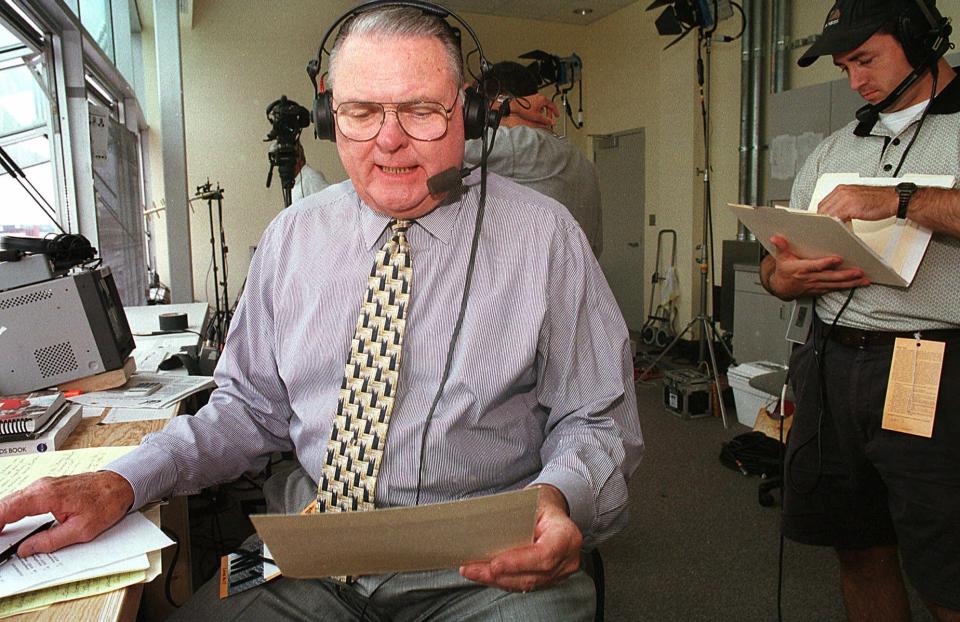
Start with Russ Hodges, who did the play-by-play in the 1955 Auburn-Vanderbilt game. Just three years before that, Hodges was on the call for the New York Giants vs. Brooklyn Dodgers one-game playoff for the National League pennant when Bobby Thomson hit the game-winning three-run homer ("The Giants win the pennant! The Giants win the pennant!" Hodges yelled over and over).
The following year, Jim McKay was the color analyst. Frank Gifford and Ray Scott worked the 1960 game, beginning a four-year stretch for Scott -- who also was the play-by-play announcer for the first two Super Bowls.
Every year, the list of announcers who did Gator Bowl games grew more distinguished: Al Michaels, Lindsey Nelson, Jim Simpson, Curt Gowdy, Bill Flemming, Bud Wilkinson, Chris Schenkel, Keith Jackson, Verne Lundquist, Mike Patrick, Ron Franklin, Gary Bender, Charlie Jones, Pat Haden, Tom Hammond and Gary Danielson.
Then there was the 1986 game between Stanford and Clemson, when Jim Nantz was a sideline reporter.
ESPN will air this year's game for the 16th time, the last 13 in a row. The longest stretch of Gator Bowl games aired by one network was 14 in a row by ABC from 1972-1985. Jackson, synonymous with college football by many fans, worked six Gator Bowls, three each with former coaches Frank Broyles and Ara Parseghian. Michaels did seven of those games, with Lee Grosscup.
Then there was the all-NFL quarterback team for the 2009 Clemson vs. Nebraska game: Former Jaguar Steve Beuerlein and Hall of Famer Dan Fouts.
Other notable analysts or sideline reports at Gator Bowls: Lynn Swann, James Brown, Joe Theisman, Tracy Wolfson, Craig James and Jeannine Edwards.
A season of sports
The football game used to be only a part of several weeks of activities put on by the Gator Bowl committee.
There was a four-team Gator Bowl basketball tournament a few nights before the football game. Florida and Jacksonville University were two of the most frequent participants but other teams included Georgia, Clemson, LSU, Navy, Virginia Tech, Georgia Tech, Illinois, St. Bonaventure, Penn State and St. Joseph's.
And how's this for being a versatile athlete: the Gators' Rick Casares gained 86 yards and scored a touchdown in UF's 14-13 victory over Tulsa in 1953. A year earlier, he was the MVP of the Gator Bowl basketball tournament.
Other activities included a Gator Bowl sailing regatta, a tennis tournament, a golf tournament, a 5K run and a bowling tournament. Almost all of the activities outside the football game began to phase out for lack of interest in the 1980s.
Today, only the Henry Tuten Gator Bowl Pro-Am golf tournament remains.
There also used to be a Gator Bowl queen and a parade.
Consolation prize
The Gator Bowl awards two game MVPs, one for the winning team and one for the losing team.
The winning team MVPs include college stars such as Fred Biletnikoff (Florida State), Pat Sullivan (Auburn), Amos Lawrence (North Carolina), Tony Lilly (Florida), Thurman Thomas (Oklahoma State), James Stewart (Tennessee), Donovan McNabb (Syracuse), Michael Vick (Virginia Tech), Phillip Rivers (N.C. State), EJ Manuel (FSU), Josh Dobbs (Tennessee) and last year's MVP, Sam Hartman of Wake Forest.
But what college coach wouldn't have wanted to field a team with a few of the losing side MVPs: John David Crow (Texas A&M), Maxie Baughn (Georgia Tech), Dave Robinson (Penn State), Floyd Little (Syracuse), Archie Manning (Ole Miss), Earl Campbell (Texas), Anthony Carter (Michigan), George Rogers (South Carolina), Andre Rison (Michigan State), Calvin Johnson (Georgia Tech), Denard Robinson (Michigan), Todd Gurley (Georgia), Josey Jewell (Iowa) and Lamar Jackson (Louisville).
On the subject ...
While we're talking about game MVPs, two players have earned the MVP award for being on the winning side and the losing side, Joe Childress of Auburn and Thurman Thomas.
Childress was the MVP when Auburn beat Baylor 33-13 in 1954 when he gained 134 yards on 20 carries, scored two touchdowns and kicked two extra points.
The following season, when the Tigers lost to Vanderbilt 25-13, Childress gained 58 yards rushing and caught one pass for 22 yards.
Thomas was the winning side MVP in 1984 when the Cowboys beat South Carolina 21-14. He gained 155 yards on 32 carries and threw a touchdown pass on a trick play. In 1985, when Oklahoma State lost to FSU 34-23, Thomas had 97 yards rushing, caught three passes for 44 yards, caught a 29-yard TD pass and for the second year in a row, threw a TD pass. He remains the only non-quarterback to throw for two touchdowns in Gator Bowl history.
More MVP lore
Three winning team MVPs went on to be head coaches at the college or NFL level, Jim Dooley (played for Miami in the 1952 Gator Bowl and later coached the Chicago Bears), Galen Hall (played for Penn State in the 1961 Gator Bowl and coached the University of Florida) and Pat Sullivan (played for Auburn in the 1971 Gator Bowl and returned to coach at his alma matter.
A losing team MVP who went to achieve more success than any of them was Vince Dooley, who played for Auburn in the 1954 Gator Bowl and went on to coach the Georgia Bulldogs for 25 years, winning six SEC titles and a national championship.
Crow went from being the losing team MVP for the Aggies in 1957 to coaching Northeast Louisiana, then serving as the Texas A&M athletic director.
Nick Sorenson was the losing team MVP for Virginia Tech in 1998 and has gone on to coach at five NFL teams, including a one-year stint with the Jaguars as the special teams coordinator in 2021.
Box score gems
It's amazing what you find when you really dig into box scores
Take the 1966 Gator Bowl, when Tennessee beat Syracuse 18-12. Floyd Little set a game record with 216 yards that stood until Trayveon Williams of Texas A&M (236) broke it in 2018. Another Pro Football Hall of Famer had a good day for the Orange in 1966, with Larry Csonka gaining 114 yards.
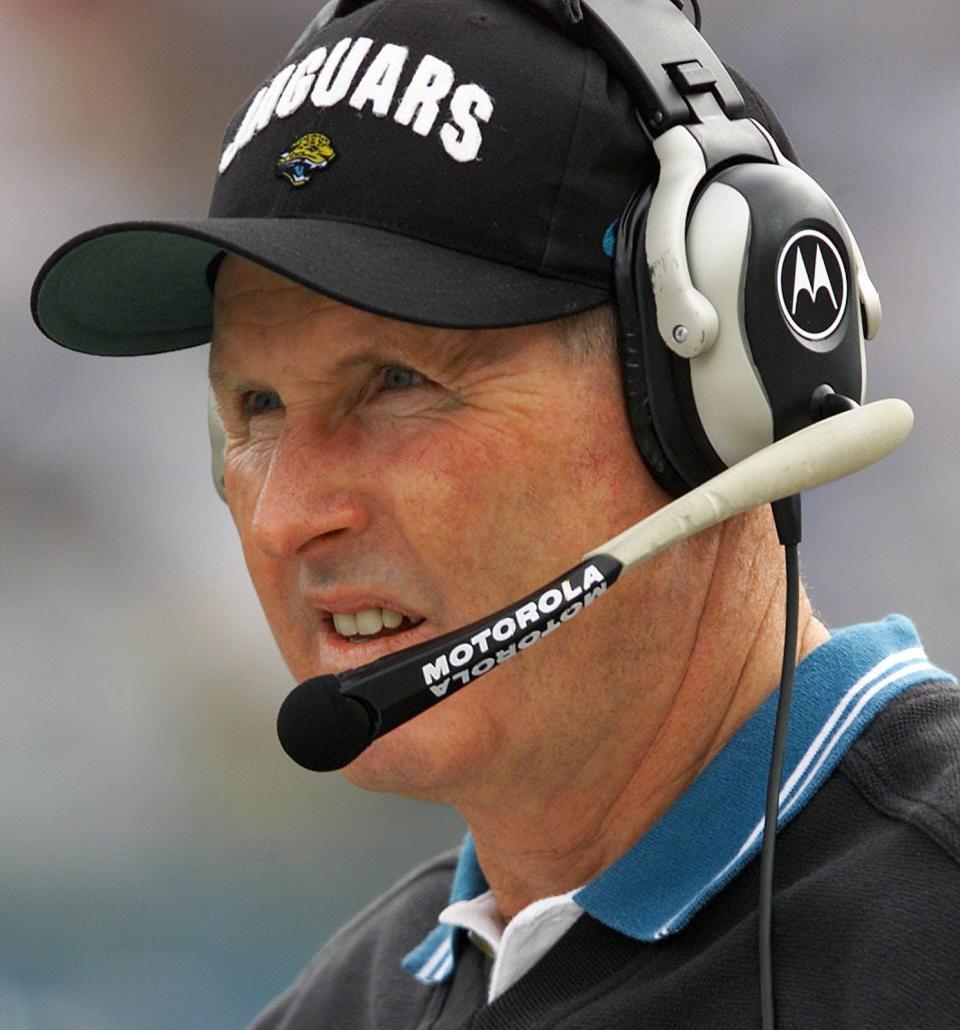
Tucked away after those two names is another running back who got one carry, for 6 yards: Tom Coughlin, who later became the first Jaguars coach.
Coughlin wasn't the only Gator Bowl participant who would go on to coach pro football in Jacksonville. Lindy Infante caught three passes for 47 yards in Florida's 13-12 victory over Baylor in 1960, and later coached the Jacksonville Bulls in the USFL.
Corky Rogers, who made high school coaching history at Lee and Bolles, played for Georgia Tech in the 1965 Gator Bowl, catching one pass for 9 yards in a 31-21 victory over Texas Tech. Rogers later coach the Jacksonville Firebirds in the American Football Association.
Not many close games
By NCAA decree (barring certain circumstances such as last year), teams must have .500 or better records to play in bowls. That usually means two good teams battling.
However, that hasn't translated into that many close games in Gator Bowls. There have been 31 one-score games out of the 77 played (.402), with eight of those in the first 16 years.
There have been eight one-score games in which the winning team scored the go-ahead points in the fourth quarter to win. The most recent was the 2020 game when Eric Gray of Tennessee scored from 16 yards out to give the Volunteers a 23-22 victory over Indiana.
Contact Garry Smits at gsmits@gannett.com and follow him on Twitter @GSmitter
This article originally appeared on Florida Times-Union: Jacksonville's Gator Bowl game has a rich history entering its 78th year

